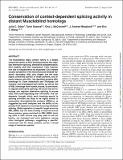| dc.contributor.author | Saxena, Tanvi | |
| dc.contributor.author | McConnell, Ona L. | |
| dc.contributor.author | Berglund, J. Andrew | |
| dc.contributor.author | Oddo, Julia Christine | |
| dc.contributor.author | Wang, Eric T | |
| dc.date.accessioned | 2017-04-11T18:46:38Z | |
| dc.date.available | 2017-04-11T18:46:38Z | |
| dc.date.issued | 2016-08 | |
| dc.date.submitted | 2016-07 | |
| dc.identifier.issn | 0305-1048 | |
| dc.identifier.issn | 1362-4962 | |
| dc.identifier.uri | http://hdl.handle.net/1721.1/108053 | |
| dc.description.abstract | The Muscleblind (MBL) protein family is a deeply conserved family of RNA binding proteins that regulate alternative splicing, alternative polyadenylation, RNA stability and RNA localization. Their inactivation due to sequestration by expanded CUG repeats causes symptoms in the neuromuscular disease myotonic dystrophy. MBL zinc fingers are the most highly conserved portion of these proteins, and directly interact with RNA. We identified putative MBL homologs in Ciona intestinalis and Trichoplax adhaerens, and investigated their ability, as well as that of MBL homologs from human/mouse, fly and worm, to regulate alternative splicing. We found that all homologs can regulate alternative splicing in mouse cells, with some regulating over 100 events. The cis-elements through which each homolog exerts its splicing activities are likely to be highly similar to mammalian Muscleblind-like proteins (MBNLs), as suggested by motif analyses and the ability of expanded CUG repeats to inactivate homolog-mediated splicing. While regulation of specific target exons by MBL/MBNL has not been broadly conserved across these species, genes enriched for MBL/MBNL binding sites in their introns may play roles in cell adhesion, ion transport and axon guidance, among other biological pathways, suggesting a specific, conserved role for these proteins across a broad range of metazoan species. | en_US |
| dc.description.sponsorship | National Institutes of Health (U.S.) (DP5 OD017865) | en_US |
| dc.language.iso | en_US | |
| dc.publisher | Oxford University Press | en_US |
| dc.relation.isversionof | http://dx.doi.org/10.1093/nar/gkw735 | en_US |
| dc.rights | Creative Commons Attribution 4.0 International License | en_US |
| dc.rights.uri | http://creativecommons.org/licenses/by/4.0/ | en_US |
| dc.source | Oxford University Press | en_US |
| dc.title | Conservation of context-dependent splicing activity in distant Muscleblind homologs | en_US |
| dc.type | Article | en_US |
| dc.identifier.citation | Oddo, Julia C. et al. “Conservation of Context-Dependent Splicing Activity in Distant Muscleblind Homologs.” Nucleic Acids Research 44.17 (2016): 8352–8362. | en_US |
| dc.contributor.department | Koch Institute for Integrative Cancer Research at MIT | en_US |
| dc.contributor.mitauthor | Oddo, Julia Christine | |
| dc.contributor.mitauthor | Wang, Eric T | |
| dc.relation.journal | Nucleic Acids Research | en_US |
| dc.eprint.version | Final published version | en_US |
| dc.type.uri | http://purl.org/eprint/type/JournalArticle | en_US |
| eprint.status | http://purl.org/eprint/status/PeerReviewed | en_US |
| dspace.orderedauthors | Oddo, Julia C.; Saxena, Tanvi; McConnell, Ona L.; Berglund, J. Andrew; Wang, Eric T. | en_US |
| dspace.embargo.terms | N | en_US |
| dc.identifier.orcid | https://orcid.org/0000-0002-5820-6656 | |
| mit.license | PUBLISHER_CC | en_US |
